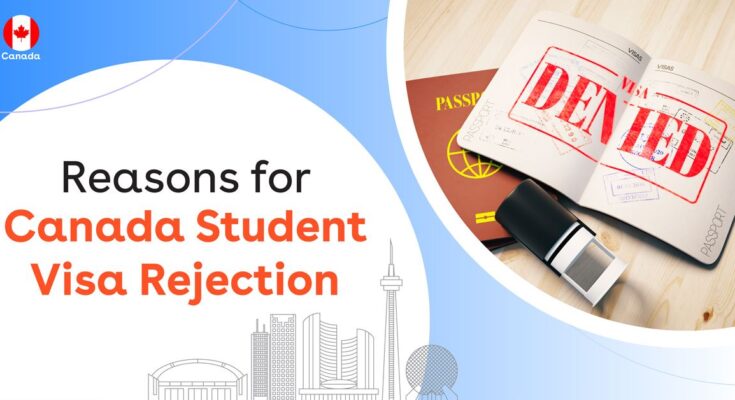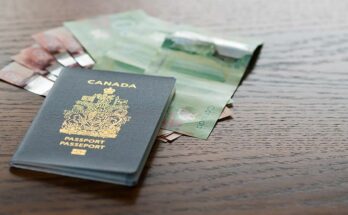Canada has become a prime destination for international students seeking high-quality education and cultural exposure. With its diverse population, renowned universities, and a welcoming environment, it’s no wonder students from all corners of the globe aspire to study in Canada.
However, gaining admission to a Canadian institution is just the first hurdle; securing a student visa is equally important. Unfortunately, many students face visa rejections, disrupting their plans and dreams.
In this article, we’ll dive deep into the common reasons for Canada student visa rejections and how to avoid them.
Common Reasons for Canada Student Visa Rejection
Incomplete or Incorrect Documentation
One of the leading reasons for student visa rejection is incomplete or incorrect documentation. Immigration officers require precise and complete information to process an application.
- Missing Required Documents
Documents such as valid passports, financial statements, academic transcripts, and admission letters are critical. Missing even one can lead to outright rejection. Applicants often overlook smaller requirements, like providing translated copies of documents, which can become a stumbling block. - Inconsistent Information in the Application
If the details in your forms, transcripts, and other documents don’t align, it raises red flags for immigration officers. For instance, mismatched spellings of names or contradictory details about employment history can lead to rejection.
Lack of Proof of Financial Support
Canada requires international students to prove they can finance their education and living expenses. Without adequate financial proof, your visa application is likely to fail.
- Insufficient Bank Balance
Students must show that they can pay tuition fees, along with a minimum of CAD 10,000 per year for living expenses. Failure to demonstrate this financial capacity leads to rejection. - Lack of Supporting Documents for Sponsors
If you’re relying on a sponsor, it’s essential to include proof of their ability to support you, such as their bank statements or income certificates. Missing this can jeopardize your application.
Issues with the Letter of Acceptance (LOA)
Your LOA from a Designated Learning Institution (DLI) is the backbone of your visa application. Any issues with this document can result in rejection.
- Unrecognized Institutions
If your LOA comes from a non-DLI institution, it won’t be accepted by immigration authorities. Always ensure that the institution is government-approved. - Conditional LOAs
A conditional LOA—issued when you haven’t met certain prerequisites—can sometimes weaken your application, especially if the conditions seem too challenging to fulfill.
Weak Statement of Purpose (SOP)
The SOP serves as a window into your academic goals and future plans. A poorly written SOP can seriously hurt your chances.
- Lack of Clarity About Academic Goals
If your SOP doesn’t convincingly explain why you’ve chosen a particular program or how it aligns with your past education, it will raise doubts. - Unconvincing Post-Study Plans
Immigration officers need assurance that you’ll return to your home country after completing your studies. If your SOP doesn’t convincingly outline these plans, it may lead to rejection.
Gaps in Education
Unexplained gaps in your education timeline can cast doubt on your application.
- Unexplained Gaps
If you took a break from studies without valid reasons, it can suggest a lack of focus or commitment. - Failure to Justify Gaps with Evidence
Providing evidence such as employment records, certifications, or personal circumstances can mitigate this issue.
Additional Reasons for Visa Rejection
Language Proficiency Issues
Canada places significant emphasis on language proficiency, and failing to meet the required standards can be a major obstacle in obtaining a student visa.
- Low IELTS or TOEFL Scores
A low score on language proficiency tests like IELTS or TOEFL signals that the applicant may struggle with academic programs taught in English or French. Immigration officers view this as a red flag, especially if the minimum score set by the institution is not met. - Failure to Meet Language Requirements
Some students assume that a marginally lower score might be overlooked. However, strict adherence to language requirements is enforced, and applications are often rejected if the specified benchmarks are not achieved.
Poor Travel History
An applicant’s travel history can also play a significant role in determining the success of their visa application.
- Lack of Previous International Travel
If you’ve never traveled internationally, immigration officers may question your ability to adhere to visa conditions. While this isn’t a standalone reason for rejection, it can contribute to the officer’s overall decision. - Overstayed Visas in the Past
If you have overstayed a visa in another country, it raises concerns about your credibility and compliance with immigration rules. Past violations of immigration laws can significantly diminish your chances of obtaining a Canadian student visa.
Suspicion of Immigration Intent
Canada is welcoming to international students, but the immigration authorities want to ensure that applicants have genuine academic intentions.
- Failure to Prove Temporary Intent
If you cannot convince the immigration officer that your primary goal is to study in Canada and return to your home country afterward, your application may be denied. Highlighting strong ties to your home country—such as family, property, or employment—helps establish this intent. - Overemphasis on Migration in the SOP
If your Statement of Purpose leans too heavily on long-term plans to settle in Canada rather than focusing on your education, it may raise suspicions about your actual intent.
Academic Performance Concerns
Your academic history provides insights into your ability to handle the rigor of Canadian education. Poor performance or discrepancies can lead to rejection.
- Poor Academic History
If your grades or academic performance in previous studies do not meet the standards expected by your chosen institution, it could result in rejection. Academic excellence signals readiness for the challenges of studying abroad. - Discrepancy Between Past Education and Future Plans
If your proposed course of study does not align with your previous education or professional background, it raises questions about the legitimacy of your application. For example, switching from engineering to business without a clear explanation might seem suspicious.
Errors in Visa Application Form
Even small mistakes in your application can lead to unnecessary rejection.
- Typographical Mistakes
Errors in your name, passport number, or other vital details can delay the process or result in outright rejection. Double-check every detail before submission. - Inaccurate Personal Details
Providing false or misleading information can permanently damage your chances of getting a visa. Accuracy and honesty are essential for a successful application.
Tips to Avoid Student Visa Rejection
Double-Check Documentation
Carefully review your documents before submitting the application. Use a checklist to ensure nothing is missed. Even small errors can lead to significant consequences.
Prove Financial Stability
Prepare comprehensive financial documents that demonstrate your ability to cover tuition fees and living expenses. Include proof of funds, income certificates, and sponsorship letters if applicable.
Write a Strong Statement of Purpose (SOP)
Your SOP is your chance to connect with the visa officer. Clearly outline your academic goals, reasons for choosing Canada, and post-study plans. Make it concise, genuine, and compelling.
Meet Language Proficiency Requirements
Prepare thoroughly for language proficiency tests like IELTS or TOEFL. Achieving scores that meet or exceed the minimum requirements of your institution improves your application’s chances.
Be Honest and Transparent
Honesty is key. Provide accurate information and address any potential red flags, such as gaps in education or financial challenges, with credible explanations.
Consequences of Visa Rejection
Impact on Future Visa Applications
A visa rejection doesn’t mean the end of the road, but it can complicate future applications. Immigration authorities will scrutinize reapplications more thoroughly, making it essential to address the reasons for the initial rejection.
Financial and Emotional Strain on Applicants
Visa rejection can be disheartening, especially after investing time, money, and effort. It’s important to stay resilient, learn from the experience, and prepare a stronger application.
Steps to Take After a Visa Rejection
Understand the Reasons for Rejection
Carefully read the rejection letter to identify the specific reasons provided by immigration authorities. This will help you address the issues effectively in your next application.
Prepare for Reapplication
Gather the necessary documents and fix any discrepancies or gaps identified in the rejection letter. Strengthen your application by addressing the weaknesses.
Seek Professional Guidance
Consult immigration experts or educational consultants who can guide you through the reapplication process. Their expertise can significantly improve your chances of success.
Conclusion
While Canada offers immense opportunities for international students, obtaining a student visa requires careful preparation and attention to detail. From ensuring accurate documentation to writing a convincing SOP, every step matters. Avoid common mistakes, address any red flags, and present yourself as a committed and genuine student. Remember, rejection isn’t the end—it’s a chance to refine your approach and try again.



